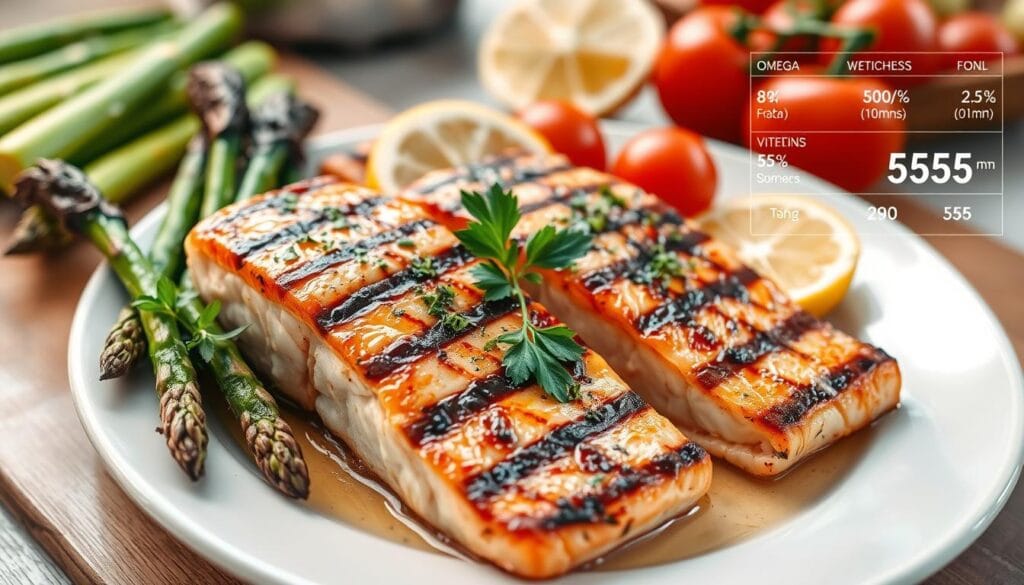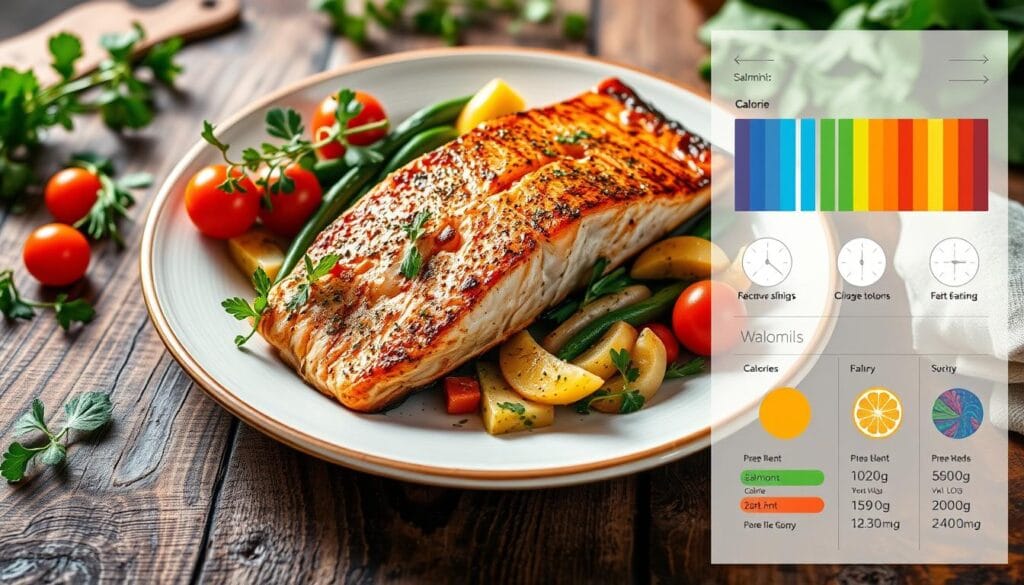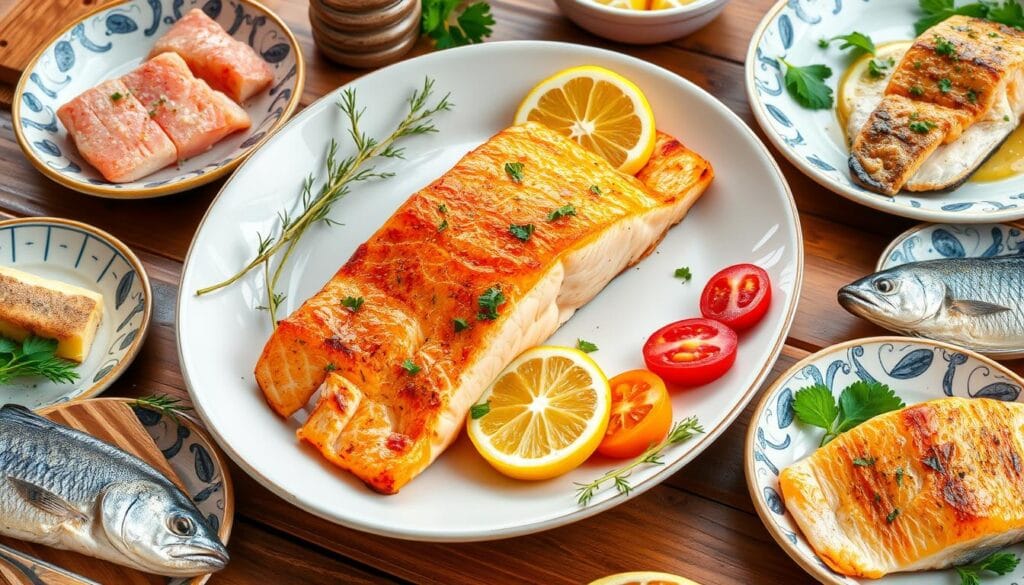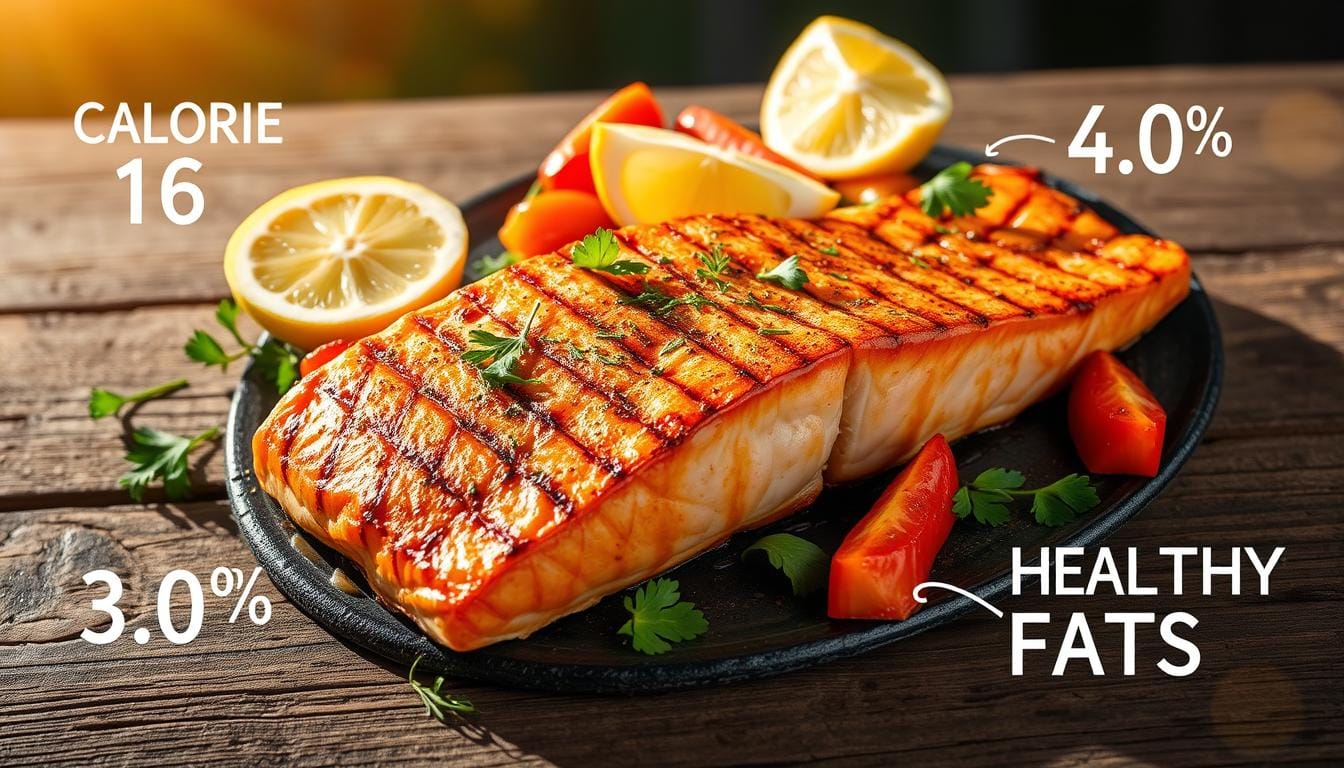Ever wondered how a single serving of grilled salmon could change your eating habits? It’s all about knowing what you eat. Grilled salmon calories are more than just numbers. They open the door to amazing health benefits that can change your diet.
Choosing a grilled salmon recipe means more than just cooking a meal. It’s about picking a food that’s full of nutrition and taste. A 4-ounce serving has about 248 calories. This makes it a great choice for those watching their calories but wanting a tasty protein.
Table of contents
What Makes Grilled Salmon a Nutritional Powerhouse?

Grilled salmon is a nutritional superstar that can change your diet and health. It’s packed with amazing health benefits that go beyond just being nutritious.
Rich Source of Omega-3 Fatty Acids
Your body needs omega-3 fatty acids, and grilled salmon has plenty. These nutrients are great for your heart. Studies show eating salmon twice a week can lower heart disease risk.
- Lowers triglycerides
- Reduces blood pressure
- Supports heart function
- Potentially improves brain health
High-Quality Protein Content
Grilled salmon is also high in protein. Each serving has over 20 grams of lean protein. This is perfect for those who work out or need a good protein source.
Essential Vitamins and Minerals
Grilled salmon is also full of vitamins and minerals. It has Vitamin D for strong bones and selenium to protect cells. This fish is a true nutritional powerhouse.
| Nutrient | Benefit |
|---|---|
| Vitamin B12 | Supports energy production |
| Vitamin D | Strengthens immune system |
| Potassium | Regulates blood pressure |
| Selenium | Protects cellular health |
“Salmon is not just food; it’s a nutritional investment in your health.” – Nutrition Expert
Adding grilled salmon to your diet is a tasty choice that supports your health long-term.
Understanding Grilled Salmon Calories per Serving
Learning about the calories in grilled salmon helps you make better food choices. It supports your health and wellness goals.

Tracking your nutrition is key, and knowing grilled salmon calories is important. It’s a nutrient-rich food with great health benefits.
Average Caloric Content Breakdown
Wild salmon has about 136 calories per 100g. A 3-ounce serving usually has:
- Approximately 121 calories
- 17g of high-quality protein
- 5.4g of total fat
- Zero carbohydrates
Serving Size Considerations
Your portion size affects the calories you eat. A palm-sized serving helps control portions and ensures you get the best nutrition.
| Salmon Type | Calories per 3oz | Protein Content |
|---|---|---|
| Wild-Caught Salmon | 121 | 17g |
| Farmed Salmon | 177 | 16g |
“Salmon offers a perfect balance of nutrition and flavor for health-conscious individuals.” – Nutrition Expert
Grilled salmon calories can change based on how it’s prepared and what’s added. Wild-caught salmon is leaner and more nutritious for your meals.
Comparative Analysis: Grilled Salmon vs. Other Fish
Choosing the right fish for your diet can be tough. Grilled salmon nutrition info shows it’s a top choice. It’s packed with protein and stands out from other fish.

Salmon vs. Tilapia: Nutritional Showdown
Salmon is a nutritional powerhouse compared to tilapia. Tilapia is leaner, but salmon has more omega-3 fatty acids. Here’s a quick comparison:
- Salmon: 206 calories per 100g
- Tilapia: Approximately 128 calories per 100g
- Omega-3 content: Salmon is substantially higher
Salmon vs. Tuna: A Nutrient-Rich Comparison
Tuna is popular, but salmon has unique nutritional benefits. Grilled salmon nutrition info shows some interesting facts:
- Calorie content: Tuna slightly lower (about 184 calories per 100g)
- Omega-3 fatty acids: Salmon significantly richer
- Vitamin profile: Salmon provides more complete vitamin B complex
“Not all fish are created equal. Salmon stands out as a nutritional champion.” – Nutrition Experts
The American Heart Association suggests eating at least two fish servings a week. Low calorie grilled salmon is a great choice for those who care about their health.
Health Benefits of Choosing Grilled Salmon
Grilled salmon is not just tasty; it’s also super good for you. It’s full of nutrients that can make you feel better. Adding it to your meals can boost your health.
Grilled salmon is more than just food. It’s a superfood that helps your body in many ways.
Heart Health Improvements
Grilled salmon is great for your heart. It’s full of omega-3 fatty acids. Studies show that eating salmon can:
- Reduce triglyceride levels
- Lower blood pressure
- Improve cholesterol balance
- Decrease risk of heart disease
“Regular consumption of salmon can significantly improve heart health and reduce inflammation,” reports nutrition experts.
Brain Function Support
Grilled salmon can also make your brain work better. Its omega-3s and protein help your brain stay sharp. This can improve memory and focus.
Eating salmon 2-3 times a week is best. It gives you vitamins D, selenium, and protein. These are good for your brain.
Choosing grilled salmon is a smart choice for your health. It’s packed with nutrients that make it a great meal option.
Cooking Methods and Their Impact on Calories
When you cook low calorie grilled salmon, how you do it matters a lot. Different ways of cooking can change how many calories it has. This affects its health benefits too.
Knowing how cooking methods affect your grilled salmon weight loss goals is key. It helps you make better food choices. Let’s look at the best ways to cook salmon without adding too many calories.
Grilling vs. Baking: A Calorie Comparison
Grilling and baking are top choices for cooking salmon with few extra calories. Here’s what you need to know:
- Grilling gives a smoky taste with little oil
- Baking cooks gently, keeping nutrients in
- Both keep salmon’s calorie count low
Frying can add 50-100 extra calories per serving compared to grilling or baking.
Selecting the Right Oils for Grilling
Choosing the right oil for grilling salmon is important for keeping calories low. Go for oils that are good for your heart:
- Extra virgin olive oil
- Avocado oil
- Coconut oil in small amounts
“The key is moderation – a light brush of healthy oil can enhance flavor without significantly increasing calories.”
Studies show baking keeps omega-3 fatty acids better than frying. This makes baking great for those trying to lose weight with grilled salmon.
Preparing Grilled Salmon at Home
Cooking a healthy grilled salmon recipe at home is easier than you might think. This dish will make your dinner routine better with simple ingredients and expert techniques.
Creating the perfect grilled salmon needs careful preparation and attention to detail. The right ingredients and cooking method can make your meal special.
Essential Ingredients
Gather these key ingredients for your healthy grilled salmon recipe:
- Fresh salmon fillets (5-6 ounces each)
- Extra virgin olive oil
- Fresh lemon juice
- Kosher salt (¾ teaspoon)
- Freshly ground black pepper (¼ teaspoon)
- Optional herbs and seasonings
Step-by-Step Grilling Process
Follow these steps to prepare your grilled salmon diet-friendly dish:
- Preheat grill to 375-400 degrees Fahrenheit
- Brush salmon with olive oil
- Season with salt and pepper
- Place salmon skin-side down on hot grates
- Grill for 6-8 minutes without flipping
- Check internal temperature reaches 135-140°F
- Let rest for 5 minutes before serving
| Cooking Parameter | Recommended Value |
|---|---|
| Grill Temperature | 375-400°F |
| Cooking Time | 6-8 minutes |
| Internal Temperature | 135-140°F |
| Resting Time | 5 minutes |
Pro tip: Always use wild-caught salmon for a more robust flavor and best results in your healthy grilled salmon recipe.
Your grilled salmon diet-friendly meal is now ready to impress. Enjoy the perfect balance of flavor and nutrition with this simple cooking method!
Flavor Enhancements for Grilled Salmon
Turning your grilled salmon into a standout dish is easy. A few clever flavor tricks can make your low calorie grilled salmon a hit. It will please your taste buds and keep your meal healthy.
Creative Marinades for Maximum Flavor
Creating tasty marinades can boost your grilled salmon’s flavor and keep calories low. Here are some great options:
- Citrus-herb blend with lemon, dill, and garlic
- Soy-ginger marinade with minimal added sugars
- Spicy Cajun rub using paprika and cayenne
Nutritious Side Dishes to Complement Your Salmon
Choosing the right side dishes can make your meal even better. Pick sides that match the salmon’s flavor and are low in calories.
| Side Dish | Calories | Nutritional Benefit |
|---|---|---|
| Roasted Asparagus | 27 | High in fiber, vitamins |
| Quinoa Salad | 111 | Complete protein, minerals |
| Steamed Broccoli | 55 | Antioxidant-rich |
“The right marinade can transform a simple piece of fish into a culinary experience.” – Culinary Expert
For a great grilled salmon meal, mix flavors well and keep it healthy. Try different marinades, spices, and sides. This way, you’ll enjoy a meal that’s both tasty and good for you.
Frequently Asked Questions About Grilled Salmon
Grilled salmon is a tasty and healthy dish that people often ask about. It’s great for storage, preparation, and diet benefits. Knowing how to handle and enjoy this fish can enhance your cooking experience.
How to Store Leftover Grilled Salmon?
Storing leftover grilled salmon right is key to keeping it fresh and safe. Here’s how to do it:
- Put salmon in an airtight container right after it cools down
- Put it in the fridge within 2 hours of cooking
- Eat it within 3 days for the best taste and texture
- Keep it at a temperature of 40°F or below
“Proper storage is the key to preserving the delicate flavor and nutritional value of grilled salmon.” – Culinary Experts
Can You Eat Grilled Salmon Cold?
Many people ask if they can eat grilled salmon cold. The answer is yes! A 200g serving of grilled salmon has about 518 calories. It’s great in many dishes.
| Salmon Serving Size | Calories | Best Cold Serving Suggestions |
|---|---|---|
| 200g grilled salmon | 518 calories | Salads, sandwiches, wraps |
| 250g grilled salmon | 648 calories | Protein-packed meal prep |
Is grilled salmon good for diet? Absolutely! A 250g serving has lots of protein and healthy fats. It’s perfect for those watching their diet. Just remember to control your portions and be mindful of how you prepare it.
Pro tip: When eating cold salmon, make sure it’s been stored correctly. Also, eat it within 3 days to keep it safe and tasty.
Conclusion: Enjoying Grilled Salmon as Part of a Balanced Diet
Grilled salmon is packed with nutrients, making it a great choice for your meals. It’s high in protein and omega-3 fatty acids. These help with weight management and overall health.
When adding grilled salmon to your diet, watch your portion sizes. A 3-4 ounce serving is enough to get health benefits without too many calories. The omega-3s are good for your heart, brain, and can help with weight loss.
Adding salmon to your meals is easy. Just pair it with veggies, whole grains, and lean proteins. This way, you get a balanced diet that’s full of nutrients. The trick is to keep things varied and in moderation. For more great recipes please click here.
Nutrition is about finding balance and enjoying what you eat. Grilled salmon is a tasty way to support your health goals. With careful preparation and portion control, it can be a key part of a healthy lifestyle.

